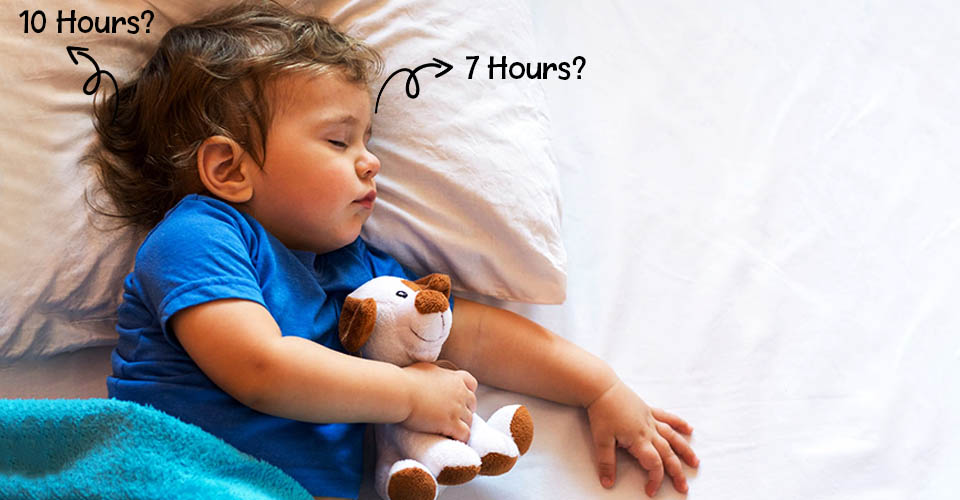Alright, dear parents and guardians, let’s have a heart-to-heart about something we all treasure but can’t seem to get enough of—sleep! Especially when it comes to our little ones.
Figuring out the magical number of sleep hours that ensures they wake up as cheerful little sunbeams can be a bit of a head-scratcher. Whether you’re tucking in a bubbly toddler or setting bedtime rules for your school-aged star, learning about the child sleep requirements is crucial.
Now, you might be thinking, “Isn’t sleep just…sleep?” Ah, if only it were that simple! The amount of shut-eye your child needs varies not just by age, but also by individual needs and lifestyle factors.
But fear not! We’re here to break it all down for you, with expert insights and easy-to-follow tips that’ll have you mastering your child’s sleep schedule in no time. But first, let us understand the importance of sleep for children.
Importance of Sleep for Children
Sleep is a fundamental component of a child’s development, impacting everything from physical growth to cognitive functioning. Dr. Nilong Vyas, a pediatrician and founder of Sleepless in NOLA, emphasizes the importance of establishing healthy habits to meet child sleep requirements.
He says developing sleep habits early helps in improving the sleeping schedule later in life.
1. Helps In Physical Growth Of Children
Physical growth and development are significantly influenced by sleep, as it is during this restful period that the body releases essential growth hormones. These hormones contribute not only to height and weight gain but also to the repair and development of muscles and tissues, making child sleep requirements an integral part of a child’s physical maturation.
2. Develops Cognitive Abilities of Children
Cognitive functioning, including memory consolidation, information processing, and neural connectivity, is deeply affected by sleep.
Research suggests that children who get insufficient sleep show alterations in brain structure, particularly in areas responsible for attention, memory, and inhibition control. These changes can have long-term consequences on a child’s mental and behavioral health, underscoring the need for adequate sleep (NIH).
3. Improves Emotional Regulation In Children
Emotional regulation is another critical aspect influenced by sleep.
Well-rested children tend to have better control over their emotions and behaviors, displaying less impulsivity and aggression. The ability to manage stress and cope with daily challenges is also enhanced with sufficient sleep.
4. Helps To Develop Immune System
Moreover, sleep is crucial for maintaining a strong immune system in children, reducing their susceptibility to illnesses and aiding in faster recovery when they do fall sick. The link between adequate sleep and reduced risks of developing chronic conditions like obesity, diabetes, and cardiovascular diseases later in life has also been observed.
Let’s take a look at what experts recommend for each age group.
Read More: Is Your Child Suffering From Childhood Insomnia? Exploring The Causes And Treatment
Child Sleep Requirements: A Breakdown For Each Age
Understanding the sleep needs of your child is crucial for their health, growth, and development.
Dr Edith Bracho Sanchez, a pediatrician with The American Academy of Pediatrics (AAP) has laid down specific guidelines that outline the optimal amount of sleep required by children at various stages of their development.
The child sleep requirements laid down by researchers include:
1. Newborns (0-3 months)
During this initial stage, newborns require between 14 to 17 hours of sleep over 24 hours. Sleep at this age is characterized by irregular patterns, with periods of wakefulness interspersed with sleep.
Dr. Daniel Lewin, Associate Director of Sleep Medicine at Children’s National Health System, points out that irregular child sleep patterns are normal in newborns due to their developing circadian rhythms.
Understanding child sleep requirements and learning techniques such as sleep training will help you provide adequate sleep to your baby.
2. Infants (4-11 months)
As infants grow, their sleep consolidates, and they require about 12 to 15 hours of sleep. Establishing a consistent bedtime routine can be particularly beneficial in regulating child sleep patterns during this stage. Dr. Jodi Mindell, a psychologist specializing in pediatric sleep medicine, emphasizes the importance of a bedtime routine, including activities like reading and soothing music, to signal to the infant that it’s time to wind down for sleep.
3. Toddlers (1-2 years)
Toddlers need approximately 11 to 14 hours of sleep. This age group often transitions from two naps to one during the day.
Dr. Harvey Karp, renowned for his work on infant and toddler sleep, suggests that this transition can vary greatly among toddlers. Maintaining a consistent naptime routine can aid in child sleep requirements for this age.
4. Preschoolers (3-5 years)
Preschoolers should get between 10 to 13 hours of sleep. Consistent bedtime routines and a sleep-conducive environment, free from noise and light distractions, are crucial. Dr. Mindell also highlights the role of such routines in signaling to the child’s body that it’s time to relax and prepare for sleep.
5. School-aged Children (6-13 years)
For this group, 9 to 11 hours of sleep are recommended. At this stage, electronic devices can significantly impede sleep quality, so limiting screen time before bed is advised. Dr. Lewin notes the impact of screens on sleep, recommending that screens be turned off at least an hour before bedtime to ensure better sleep quality.
6. Teenagers (14-17 years)
According to Dr. Suresh Kotagal, a Mayo Clinic pediatric sleep expert, the sleep requirements for kids change according to their age.
Teenagers need about 8 to 10 hours of sleep, but many often get less. Dr. Mary Carskadon, a professor of psychiatry and human behavior, and a leading researcher on adolescent sleep, warns about the sleep debt accumulated by teenagers.
She says this is mainly due to early school start times and social and academic pressures. Encouraging a regular sleep schedule, even on weekends, can help mitigate some of these issues.
Read More: What Is Sleep Training: 5 Expert Tips To Help Regulate Your Child’s Sleep Pattern
How To Improve The Sleep Quality Of Your Child?
Improving child sleep pattern is vital for their physical and mental development.
Here are evidence-based strategies endorsed by sleep experts for child sleep requirements:
1. Establish a Consistent Bedtime Routine
Consistency is key in signaling to your child’s body that it’s time to wind down. Dr. Jodi Mindell, a psychologist and author on pediatric sleep, emphasizes the importance of a predictable bedtime routine that can include bathing, reading, and other calming activities.
2. Create a Sleep-Conducive Environment
Ensure your child’s bedroom is conducive to sleep. Dr. Judith Owens, Director of Sleep Medicine at Boston Children’s Hospital, suggests a quiet, dark, and cool environment. Consider using blackout curtains and white noise machines if necessary.
3. Limit Screen Time
The blue light emitted by screens can interfere with the natural sleep-wake cycle. Dr. Marc Weissbluth, a pediatrician known for his sleep research, recommends turning off all screens at least an hour before bedtime to help your child unwind and prepare for sleep.
4. Encourage Physical Activity
Regular physical activity during the day can help your child sleep better at night. Dr. Monique LeBourgeois, an associate professor, points out that outdoor play and exercise are beneficial for sleep. Her research shows that it reduces anxiety in children but you need to avoid vigorous activity close to bedtime.
5. Be Mindful of Diet You Set
What your child eats can affect their sleep. Dr. Rebecca Robbins, a sleep researcher at Harvard Medical School, advises against heavy meals close to bedtime and suggests avoiding caffeine and sugary snacks in the evening.
6. Address Stress and Anxiety In Children
Anxiety can significantly impact sleep quality. Techniques such as mindfulness and relaxation exercises recommended by Dr. Lisa Meltzer, a pediatric sleep specialist, can be effective in reducing bedtime anxiety.
7. Be a Role Model For Your Kids
Children often emulate their parents’ behaviors. By practicing good sleep hygiene yourself, you can set a positive example. Experts suggest that parents also adhere to healthy sleep habits to reinforce the importance of sleep within the family.
8. Seek Professional Help if Needed
If your child’s sleep issues persist despite these strategies, it may be time to consult a sleep specialist. Conditions like sleep apnea, restless leg syndrome, or childhood insomnia can significantly affect sleep quality and child sleep requirements.
By implementing these strategies consistently, you can help your child establish healthy sleep habits and improve their overall sleep quality.
Read More: Parentification Meaning and Its Alarming Impact! 8 Ways It’s Secretly Harming Our Kids
A Word From Mind Family
As we come to the end of our discussion on theimportance of sleep for children, we at Mind Family want to leave you with a heartfelt reminder.
Sleep is not just a luxury; it’s a necessity for your child’s physical health, mental well-being, and overall development. We’ve delved into the science behind it, explored expert advice, and offered practical tips to help you navigate the sometimes challenging terrain of establishing healthy sleep habits.
But beyond the research and recommendations, we want to emphasize one simple truth: your efforts matter.
Your commitment to creating a supportive sleep environment, establishing consistent bedtime routines, and prioritizing child sleep pattern sets a foundation for lifelong habits that promote health and happiness.
So, as you embark on this journey of nurturing your child’s sleep, remember that you’re not alone. Mind Family is here to support you every step of the way. Together, let’s ensure that our children can embrace each day with energy, enthusiasm, and the joy that comes from a restful night’s sleep.
Frequently Asked Questions (FAQs)
1. What is the importance of sleep for children?
Importance of sleep for children include growth, cognitive development, emotional regulation, and overall health.
2. How much sleep does your child need?
Child sleep requirements vary by age, from newborns requiring 14-17 hours to teenagers needing 8-10 hours.
3. How to improve the sleep quality of your child?
Improve your child’s sleep quality by establishing consistent bedtime routines, creating a sleep-conducive environment, limiting screen time, encouraging physical activity, monitoring diet, addressing stress, maintaining a sleep schedule, being a positive role model, and seeking professional help if needed.


















Leave a Reply